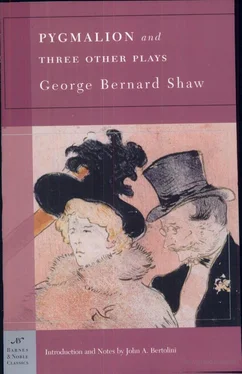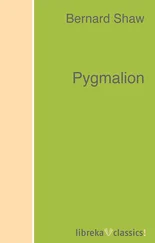LIZA [desperate] Oh, you are a cruel tyrant. I cant talk to you: you turn everything against me: I’m always in the wrong. But you know very well all the time that youre nothing but a bully. You know I cant go back to the gutter, as you call it, and that I have no real friends in the world but you and the Colonel. You know well I couldnt bear to live with a low common man after you two; and it’s wicked and cruel of you to insult me by pretending I could. You think I must go back to Wimpole Street because I have nowhere else to go but father’s. But dont you be too sure that you have me under your feet to be trampled on and talked down. I’ll marry Freddy, I will, as soon as hes able to support me.
HIGGINS [sitting down beside her] Rubbish! you shall marry an ambassador. You shall marry the Governor-General of India or the Lord-Lieutenant of Ireland, or somebody who wants a deputy-queen. I’m not going to have my masterpiece thrown away on Freddy.
LIZA You think I like you to say that. But I havnt forgot what you said a minute ago; and I wont be coaxed round as if I was a baby or a puppy. If I cant have kindness, I’ll have independence.
HIGGINS Independence? Thats middle class blasphemy. We are all dependent on one another, every soul of us on earth.
LIZA [ rising determinedly ] I’ll let you see whether I’m dependent on you. If you can preach, I can teach. I’ll go and be a teacher.
HIGGINS Whatll you teach, in heaven’s name?
LIZA What you taught me. I’ll teach phonetics.
HIGGINS Ha! Ha! Ha!
LIZA I’ll offer myself as an assistant to Professor Nepean.
HIGGINS [rising in a fury ] What! That impostor! that humbug! that toadying ignoramus! Teach him my methods! my discoveries ! You take one step in his direction and I’ll wring your neck. [He lays hands on her]. Do you hear?
LIZA [ defiantly non-resistant] Wring away. What do I care? I knew youd strike me some day. [He lets her go, stamping with rage at having forgotten himself, and recoils so hastily that he stumbles back into his seat on the ottoman]. Aha! Now I know how to deal with you. What a fool I was not to think of it before! You cant take away the knowledge you gave me. You said I had a finer ear than you. And I can be civil and kind to people, which is more than you can. Aha! Thats done you, Henry Higgins, it has. Now I dont care that [snapping her fingers ] for your bullying and your big talk. I’ll advertize it in the papers that your duchess is only a flower girl that you taught, and that she’ll teach anybody to be a duchess just the same in six months for a thousand guineas. Oh, when I think of myself crawling under your feet and being trampled on and called names, when all the time I had only to lift up my finger to be as good as you, I could just kick myself.
HIGGINS [wondering at her] You damned impudent slut, you! But it’s better than snivelling; better than fetching slippers and finding spectacles, isnt it? [ Rising ] By George, Eliza, I said I’d make a woman of you; and I have. I like you like this.
LIZA Yes: you turn round and make up to me now that I’m not afraid of you, and can do without you.
HIGGINS Of course I do, you little fool. Five minutes ago you were like a millstone round my neck. Now youre a tower of strength: a consort battleship. You and I and Pickering will be three old bachelors together instead of only two men and a silly girl.
MRS. HIGGINS returns, dressed for the wedding. ELIZA instantly becomes cool and elegant.
MRS. HIGGINS The carriage is waiting, Eliza. Are you ready?
LIZA Quite. Is the Professor coming?
MRS. HIGGINS Certainly not. He cant behave himself in church. He makes remarks out loud all the time on the clergyman’s pronunciation.
LIZA Then I shall not see you again, Professor. Good-bye. [ She goes to the door ].
MRS. HIGGINS [coming to HIGGINS] Good-bye, dear.
HIGGINS Good-bye, mother. [He is about to kiss her, when he recollects something]. Oh, by the way, Eliza, order a ham and a Stil ton cheese, will you? And buy me a pair of reindeer gloves, number eights, and a tie to match that new suit of mine, at Eale & Binman’s. You can choose the color. [His cheerful, careless, vigorous voice shows that he is incorrigible].
LIZA [ disdainfully ] Buy them yourself. [ She sweeps out ].
MRS. HIGGINS I’m afraid youve spoiled that girl, Henry. But never mind, dear: I’ll buy you the tie and gloves.
HIGGINS [ sunnily ] Oh, dont bother. She’ll buy em all right enough. Good-bye.
They kiss. MRS. HIGGINS runs out. HIGGINS, left alone, rattles his cash in his pocket; chuckles; and disports himself in a highly self-satisfied manner. {59} 59 15 (p. 459) Higgins, left alone, rattles his cash in his pocket; chuckles; and disports himself in a highly self-satisfied manner: Since the first performance of Pygmalion in England, actors and audiences have rebelled against the unresolved ending of Shaw’s first version of the play, used in this edition. In Shaw’s later revision, Higgins “roars with laughter” as he informs his mother that Eliza is going to “marry Freddy.” In so doing, Higgins conforms to the prose narrative Shaw appended to the published version of the play.

The rest of the story need not be shown in action, and indeed, would hardly need telling if our imaginations were not so enfeebled by their lazy dependence on the ready-mades and reach-me-downs of the ragshop in which Romance keeps its stock of “happy endings” to misfit all stories. Now, the history of Eliza Doolittle, though called a romance because of the transfiguration it records seems exceedingly improbable, is common enough. Such transfig urations have been achieved by hundreds of resolutely ambitious young women since Nell Gwynne [231] Eleanor Gwynne (1650-1687), English actress and mistress of King Charles II.
set them the example by playing queens and fascinating kings in the theatre in which she began by selling oranges. Nevertheless, people in all directions have assumed, for no other reason than that she became the heroine of a romance, that she must have married the hero of it. This is unbearable, not only because her little drama, if acted on such a thoughtless assumption, must be spoiled, but because the true sequel is patent to anyone with a sense of human nature in general, and of feminine instinct in particular.
Eliza, in telling Higgins she would not marry him if he asked her, was not coquetting: she was announcing a well-considered decision. When a bachelor interests, and dominates, and teaches, and becomes important to a spinster, as Higgins with Eliza, she always, if she has character enough to be capable of it, considers very seriously indeed whether she will play for becoming that bachelor’s wife, especially if he is so little interested in marriage that a determined and devoted woman might capture him if she set herself resolutely to do it. Her decision will depend a good deal on whether she is really free to choose; and that, again, will depend on her age and income. If she is at the end of her youth, and has no security for her livelihood, she will marry him because she must marry anybody who will provide for her. But at Eliza’s age a good-looking girl does not feel that pressure: she feels free to pick and choose. She is therefore guided by her instinct in the matter. Eliza’s instinct tells her not to marry Higgins. It does not tell her to give him up. It is not in the slightest doubt as to his remaining one of the strongest personal interests in her life. It would be very sorely strained if there was another woman likely to supplant her with him. But as she feels sure of him on that last point, she has no doubt at all as to her course, and would not have any, even if the difference of twenty years in age, which seems so great to youth, did not exist between them.
Читать дальше













